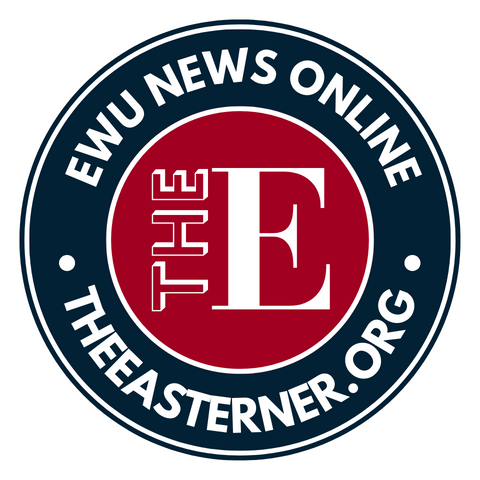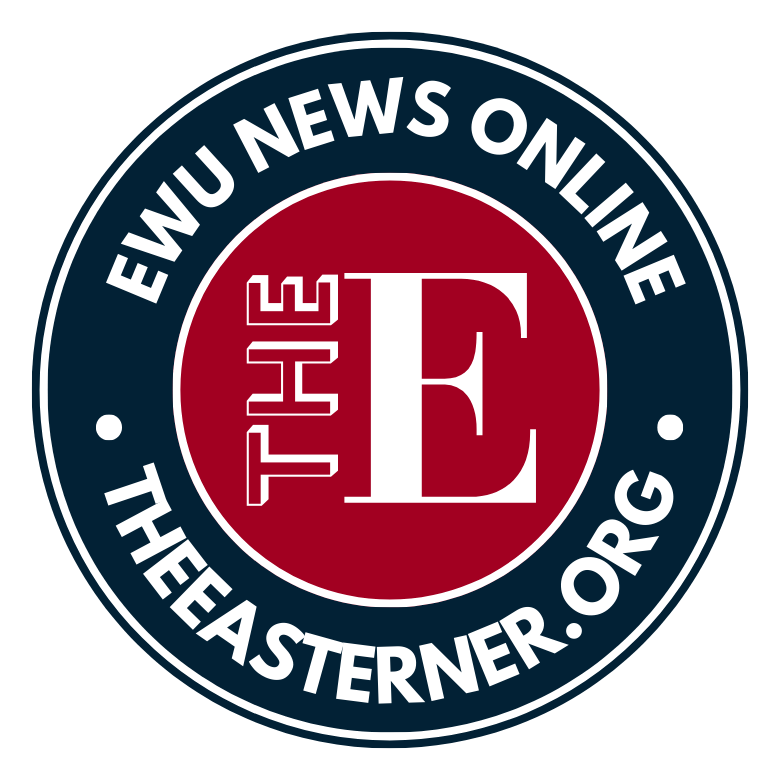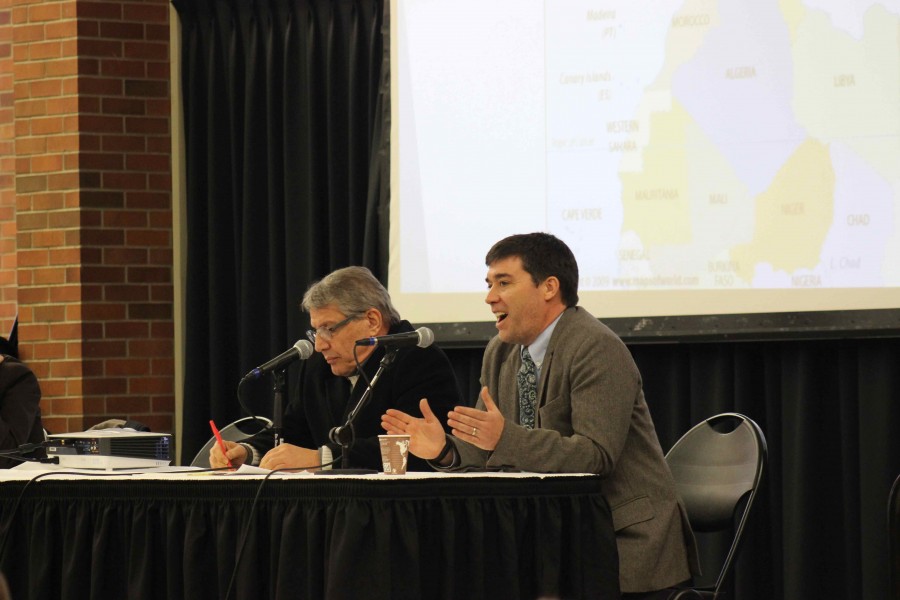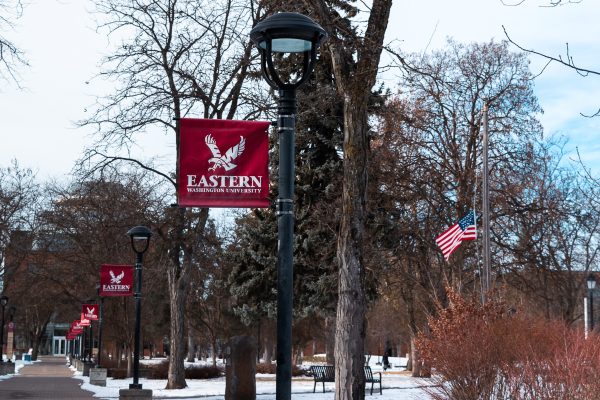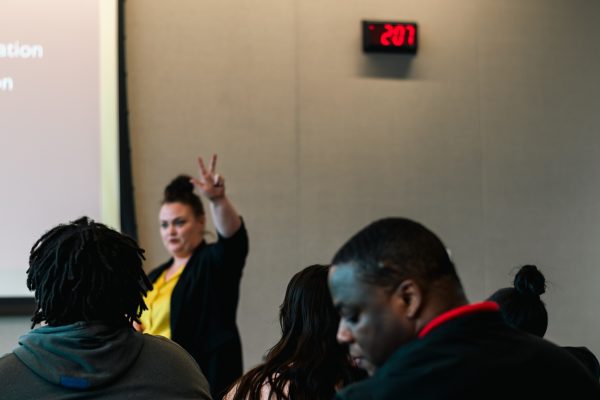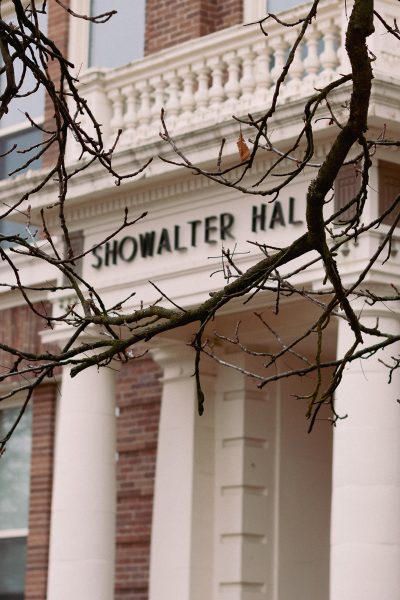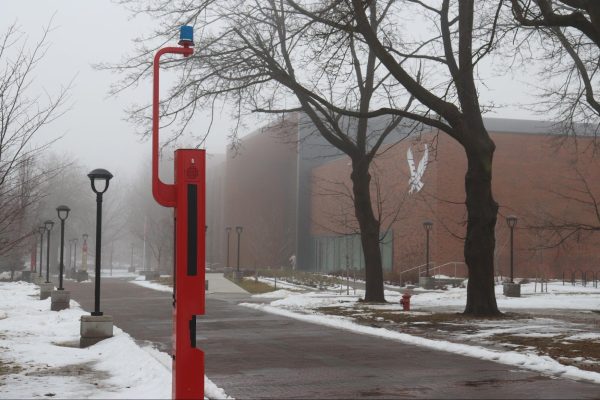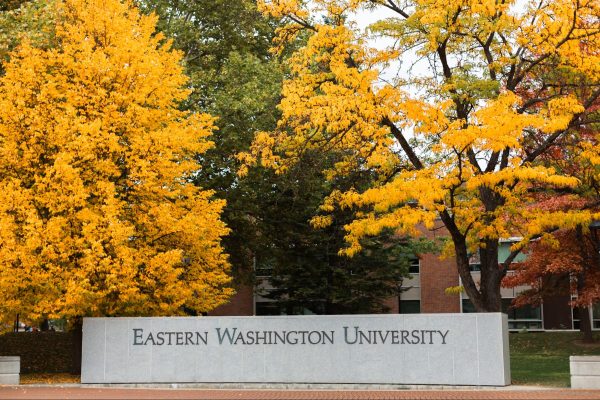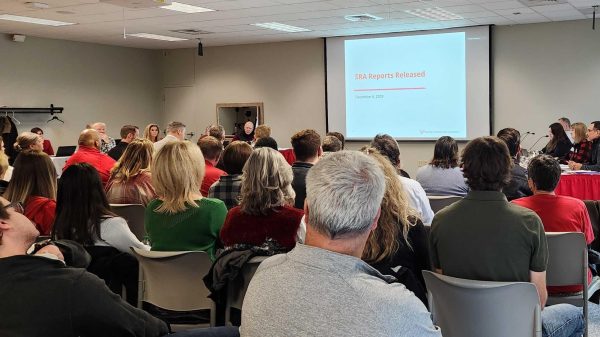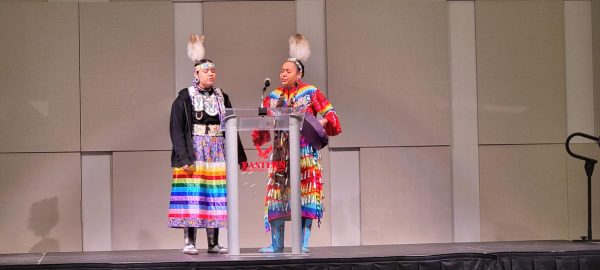SAIL holds panel on Paris Attacks
Majid Sharifi (left) and Kevin Pirch (right) speak at Apres Paris panel.
December 4, 2015
The recent terrorist attacks in Paris, France, have sparked political debates all over the world, but some students may be lost when it comes to the possible implications the attacks could have on our nation.
A panel discussion Aprés Paris was held by the Student Activities, Involvement and Leadership team on Nov. 24 in the PUB multipurpose room in order for students to learn about and discuss the attacks and what they mean for the future of France, the Middle East and the United States.
SAIL brought in three EWU political science professors, Kristin Edquist, Ph.D, Majid Sharifi, Ph.D, and Kevin Pirch, Ph.D, to speak on the panel. Vandana Asthana, Ph.D, was also meant to speak at the event but was unable to make it due to the icy roads. The professors were chosen to speak due to their expertise in their respective areas of political science. Every professor spoke for approximately ten minutes about a different aspect of the attacks and their possible effects.
Edquist, associate professor of political science covered what the attacks in Paris meant for Europe, specifically France. She began her talk with basic information about the attacks, which included a map of Paris with the locations of the attacks pinpointed and a small speech about the victims who were injured or killed. The map served to show that the attacks were not in random locations but around heavily populated areas.
She went on to say that out of 10 bombing suspects, nine were identified and found. Six of the attackers were French and one was Belgian, all of which “reflect deeply problematic domestic issues in France and the European Union.” The majority of the attackers being French shows the amount of turmoil that has been growing in the domestic relations of France. Edquist emphasized many times that the attacks were a “home grown problem” because most of the attackers were familiar with the area and they knew exactly how to go into those areas undetected.
France and Europe as a whole, must decide whether to retaliate or to change the open border policy to immigrants. The current open border system allows immigrants to pass through without a passport allowing ISIS to network and recruit members from anywhere, Edquist said.
The open borders throughout Europe will be closing, immigrants are going to be shut out and it is a terrible tragedy that is supported by popular opinions induced by the terrorist attacks, Edquist said. Edquist went on to talk about the implications of the events for the people of France: citizens are terrified and the government has begun to rethink its internal security.
Next to speak on the panel was Pirch, associate professor and department chair of the political science department. Pirch explained the significance the Paris bombings and attacks have on the United States. Tensions between the U.S. and the Middle East – the suspected origin of ISIS – have been unsteady but now that a NATO country, France, has been attacked, it is uncertain whether or not a war involving the U.S. will be started. No one wants to go to war but nations are beginning to shift their views to see ISIS as a main threat. Syria is an important issue in the aftermath of the Paris attacks because it is currently in governmental turmoil that could be exploited by a greater force such as Western governments, ISIS or the Russian government. If Syria were to fall under the control of a foreign power, it would be exploited for its location and vulnerable state, making the threat of war substantially higher. The United States as of now, however, is just a reacting party that does not have direct involvement in the matter yet, Pirch said.
The last panelist to give his talk was Sharifi, associate professor of political science and professor of international relations. Sharifi focused his talk on the Middle East, emphasizing that “the events did not happen in a social, political nor economic vacuum.” All wars, battles and struggles that happen in the Middle East are internationally connected because of allies and enemies alike, said Sharifi.
While talking about the warlike conditions Iran, Iraq, Syria, Turkey, Egypt, Palestine, Israel, Jordan, Lebanon, Kuwait, Qatar, Bahrain, Oman, Yemen, Saudi Arabia and the United Arab Emirates are enduring, Sharifi mentioned the silence of it all around the world.
“No one hears about everything that happens but attacks are happening everyday and the media is not spreading enough information about the world we live in,” Sharifi said. His central argument concerning the Paris attacks was that more people need to be educated about the attacks and who is responsible.
Sharifi discredited the myth that ISIS represents the Muslim community and the philosophy of Islam. Out of the millions of Muslims in the world only a small segment are members of ISIS and it is not right to see ISIS as just that small segment because there are so many other members of different religions and cultures involved, Sharifi said. With this the panelists finished their talks and the Q&A session began.
Aprés Paris was well attended by students and professors alike. The panel went a bit past the allotted time period of one and a half hours due to the Q&A session. A young woman asked how elections in the United States will be affected by the attacks in Paris. Pirch addressed her question saying that the elections will not be impacted beyond the candidates’ attitudes toward foreign policies. Edquist added that the terrorist attacks have impacted political parties in their attitudes on immigration, specifically the Republican party which has developed an anti-immigrant attitude.
A young man posed the question, “How will democracy defend itself against the terrorist organization’s ideals?” This question was answered by Edquist who said, “Europe has the right to govern themselves and the people will therefore decide the method of action they’ll take in response.” Sharifi added to Edquist’s response saying that the media distorts popular views of global events such as these to the point where powerful elites cannot arrive at a clear solution.
Another young man asked, “How has the silence of western media taken a role in global events such as what happened in Paris?” Sharifi said the media has globalized terror with all of the attention terrorist techniques draw, yet it has also failed to perform the one job that media has: to spread specific information about events to the public.
SAIL set the goal of informing students about the events surrounding Paris attacks and accomplished it through the panel. Despite the lack of a panelist, information and different angles of the events were thoroughly discussed and the attendees were able to get answers to their questions concerning the events.
